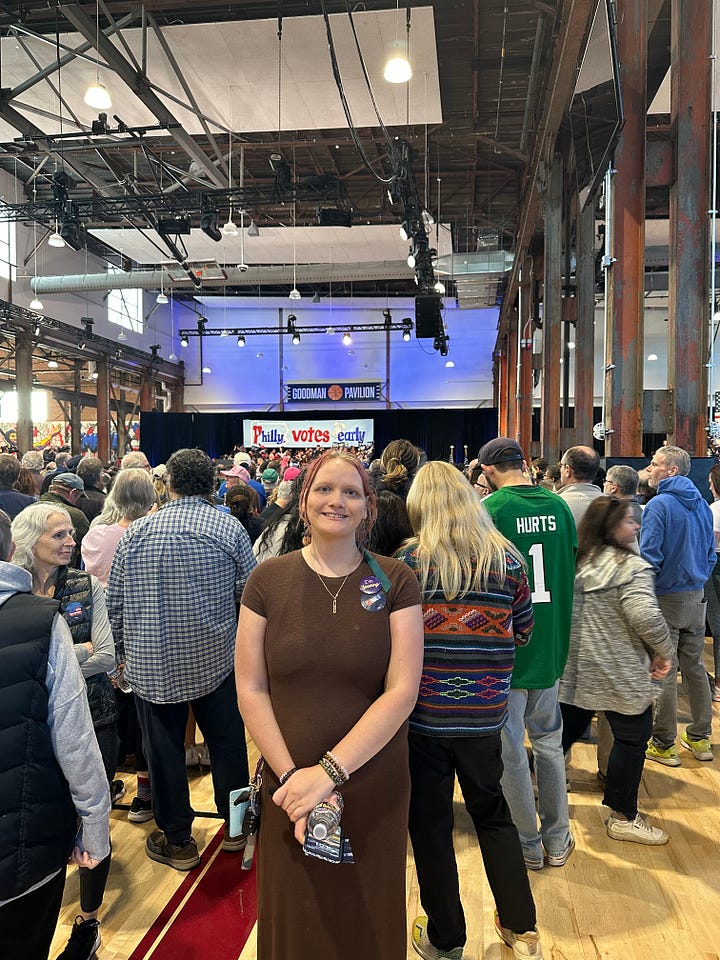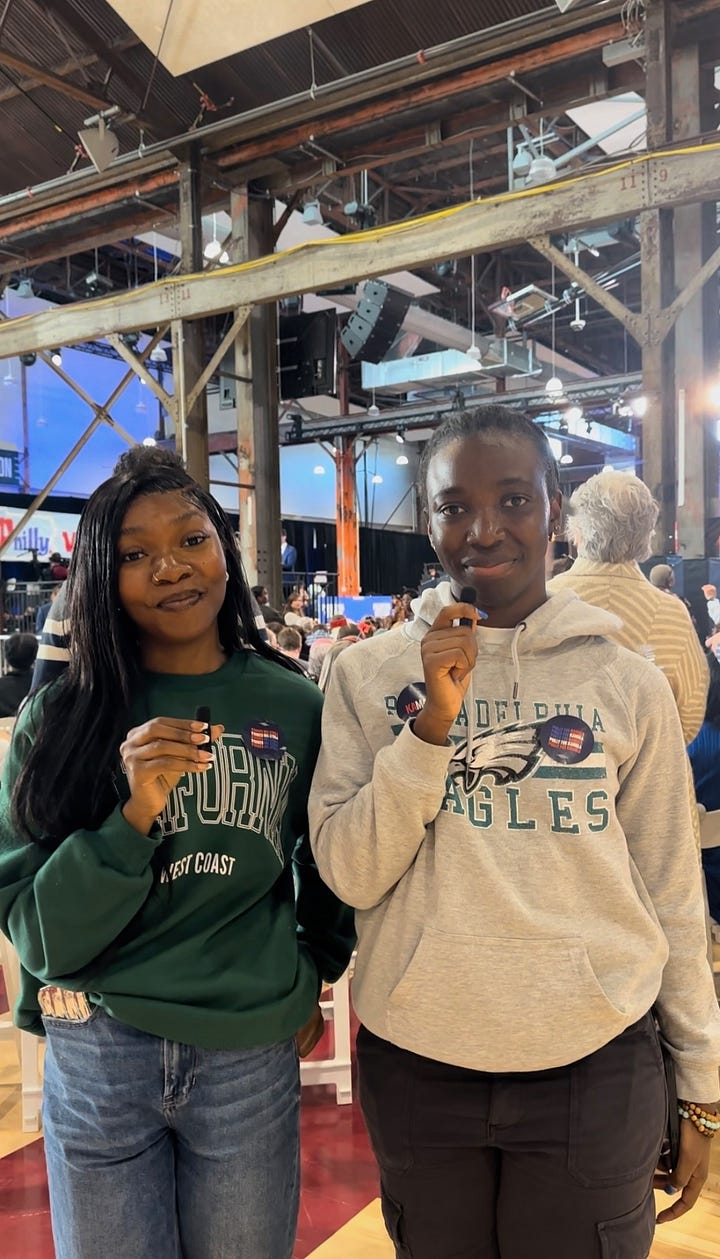What's really driving the youth gender divide?
Moderate young men feel politically homeless. Plus a Kamala Harris rally, and Vote Early Day.
👋🏻 Coming to you live from Philadelphia, Pennsylvania — a state that could very well determine who wins the presidential election. I’m spending most of the next week here, hoping to speak with as many voters before Election Day as possible.
This week, I spoke with POLITICO, Bloomberg, and The Washington Post about the current youth vote state-of-play, especially as it pertains to young men. More on that below.
On Sunday, I attended a rally for Vice President Kamala Harris, where I met a whole lot of young women supporting her. There’s been much ado about the youth partisan gender gap, and for good reason. Polling shows a huge split between young women’s support for Harris as compared to young men’s, and my own qualitative research backs that up.
While there were surely young men at Harris’ rally Sunday, the young women I spoke with were exceptionally fired up about her candidacy. They were eager to talk about how they see the gender divide unfolding in their circles. When asked what’s motivating them to vote, all of the young women below touched on prioritizing abortion access — it’s part of why they’re eager to support Harris.




Danielle, top left, is 26-years-old and had her son at 24-years-old. She voted for former President Donald Trump in 2020 and 2016. She said that after Roe v. Wade was overturned she had a change in perspective and is now canvassing and voting for Harris.
“Women’s rights matter. I care about my rights as a woman,” she said.
On the top right, Grace, 19 and a first-time voter, told me it “would be nice to tell my children that I saw the first woman president right before she got elected.”
“All the guys I know [who] are college-aged are voting for Trump,” Grace said.
“I do believe women are fighting more for their rights than men,” Emily, 20 and also top right, told me.
Bottom left, Grace, 22, and Mal, 24, told me their top issues are abortion access and student debt.
And on the bottom right, Kate, Maya, Carolyn, and Amanda are part of the University of Pennsylvania Democrats. They told me the top issues on their mind are women’s rights, abortion, democracy, and Project 2025. Asked about the gender divide they tell me they don’t know if young men “see the urgency of the election” as much as they do.
Asked where Harris should go this week to reach young voters writ large (including young men), Dakota Silver, a 27-year-old young woman (not pictured above), told me: “I know this is controversial, but I would like to see her go on Joe Rogan. I think that would be a smart move, and I think she could handle herself.”
These young women were all at Harris’ rally. But today, at an early vote rally near Philadelphia City Hall, I met Kiyonnah, 18 and a high school student, with a different point of view. She said she sees the gender divide playing out in real time in her community, but plans to vote for Trump.
“The girls are just voting for [Vice President Kamala Harris] because of gender, and that’s not fair and that’s not right,” she said. “I should not change who I want to vote because of the gender of them.”
So what’s really driving the youth partisan gender divide?
Young men who feel politically homeless might be the key factor in this race — and their disaffection with Democratic messaging could hand former President Donald Trump the election.
Most national headlines about young voters have focused on the growing youth partisan gender divide; a dynamic unfolding before our eyes that will have political and social ramifications for years to come. But the bro-vote discourse and the punditry it’s inspired assumes that this cohort of young men will vote for Trump. That’s not necessarily the case. Yet their dissatisfaction with the Democrats could still be a problem for Vice President Kamala Harris.
Trump doesn’t need to win over young men; they’d simply be additive to his base (he won in 2016 with only a fraction of youth support). But Harris does. Young voters tend to lean left and helped push Biden over the finish line in 2020. In recent polls, Harris leads Trump by roughly 20 points among voters under 35. However, while Harris enjoys overwhelming support from young women, among young men her lead is thinner. Young women under 30 back Harris by a 31-point margin in the latest Harvard youth poll, while young men support her by just 11 points.
If a portion of these men slip out of Harris’ coalition, it could spell trouble for her candidacy.
I’ve spoken with hundreds of young Americans through listening sessions, focus groups, and one on one over the past four years in battleground states like Arizona, Michigan, Pennsylvania, and Wisconsin. Their perspectives illuminate the factors contributing to the gendered rift we see reflected in quantitative data.
Young women have developed a sense of sisterhood fighting for abortion access and women’s rights in the Trump-era that’s pushed them to the left. But young men – even if they are pro-choice – aren’t prioritizing the issue in the same way (abortion ranked 17th on the list of issues most important to young men). Without a singular cause uniting young men, many describe feeling lost between the two parties.
I sat in on focus groups last month in Philadelphia with Daniel Cox, the director of the Survey Center on American Life. The young men there overwhelmingly described not knowing which party had their best interest in mind. Bret, 29, said no politician had “moved” him. For potential voters like Bret, while they may dislike Trump’s ethos, they appreciate that his often inflammatory rhetoric flies in the face of the political correctness and a cancel culture that has been present in pop culture and on the left especially in recent years.
I’ve asked these men what they’re looking for in a candidate. For those critical of Trump, Harris has an opportunity to reach them with a populist economic message. To be effective, she must address the anti-political correctness sentiment they’re frustrated by. Though she’s spent time campaigning with former Republican Rep. Liz Cheney to show Americans that she isn’t as far left as they may think she is, young men who crave a version of that message still aren’t getting it. And while some of her economic policies geared toward young people – like giving $25,000 in support to first-time home buyers – are outlined on her website or were brought up in her Call Her Daddy interview with Alex Cooper, they aren’t reaching many of these young male voters.
I recently spoke with Xander, a 19-year-old from Mesa, Arizona. He feels politically conflicted, so much so that he won’t be voting this November. While he leans left of center - in part because he values personal rights and freedoms and dislikes Republicans’ efforts to curtail them - he wasn’t inspired enough by Harris, especially when it comes to her plans (or what he described as an apparent lack thereof) to curtail inflation and promote job growth.
Others like Carter, an 18-year-old from Milwaukee, feels political correctness has gone too far and acknowledges how Trump’s sense of humor can resonate with a generation who grew up on memes. For some in the youngest cohort of male voters, they associate campus protests over Israel’s war in Gaza with progressive politics, and thus, the Democrats. They’re looking for someone in the middle.
The old phrase “socially liberal, fiscally conservative,” is now considered somewhat outdated – but has perhaps been replaced by the “Barstool conservative” – young men influenced by figures like the media mogul Dave Portnoy who is unapologetically anti-politically correct, but called the Supreme Court’s decision to overturn Roe v. Wade “insanity.”
Yet while Portnoy has said he plans to vote for the former president – not all the “Barstool conservatives” are on the Trump train. These young men are still winnable for Harris, in large part because they are pro-choice and in favor of LGBTQ rights (freedoms they’ve known in their lives), and value personal autonomy – which she’s made a focal point of her campaign. But in the home stretch, Harris must adjust her messaging to meet them where they are – not with football, hunting or beer - but with policy. What they’re craving is a more populist, moderate economic message that speaks directly to their concerns — job creation, affordable housing, and economic mobility.
Perhaps the most interesting part of all is that Harris’ platform already aligns more closely with these voters’ priorities than they might realize. But she has not yet managed to link her economic policies with the concept of personal agency, in a way that resonates with young people as part of a broader vision of freedom and opportunity. If she can connect with the men in the middle, she can bring them into her coalition - and secure a crucial slice of the electorate in battleground states needed to win.
Quavo marches to the polls
Yesterday, rapper Quavo performed at a “Party at the Polls” Vote Early Day event with Daybreaker with the likes of Bill Nye The Science Guy. The concert preceded a march to the polls, led by Quavo. Check it out.
And Harris puts Gen Z in her stump speech
In recent speeches — Friday in Houston, Texas, Saturday in Kalamazoo, Michigan, Sunday in Philadelphia Pennsylvania — Harris has been including a whole portion about Gen Z. She starts by asking if there’s anyone who’s Gen Z in the crowd, any first time voters — and goes on to tell them she loves that they are “rightly impatient for change.” At her Philly rally, for example, Harris said she knows young people’s experiences with issues like climate change, gun violence, and abortion access are personal. “I see you and I see your power,” she’s said.


Thanks for this. I do wish I knew why the young men at the Harris rally were there; what part of her message *did* resonate with them.